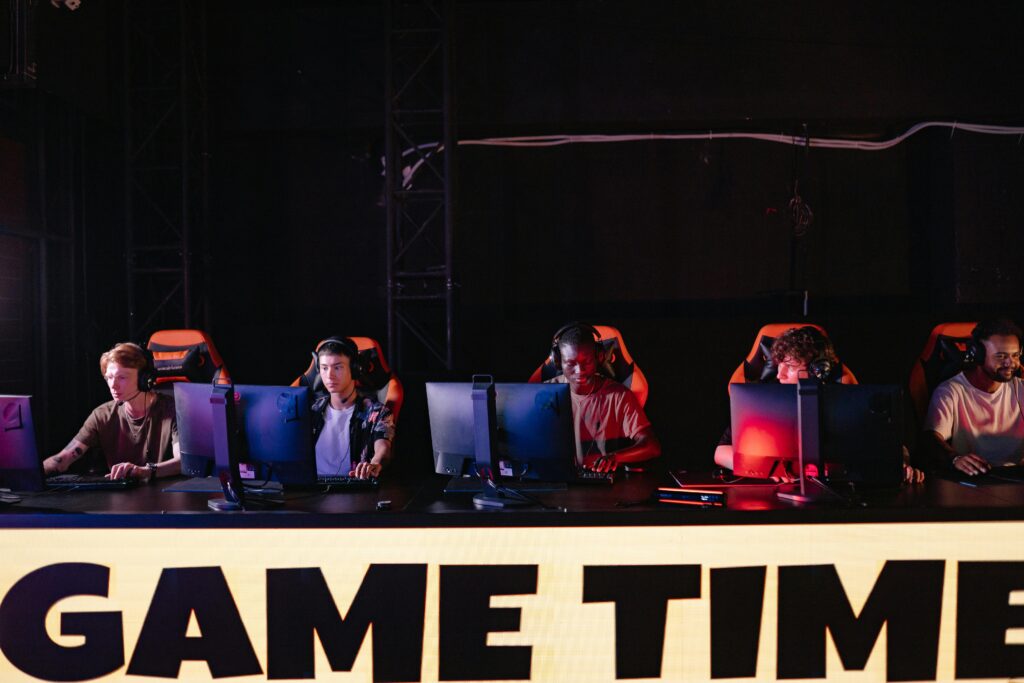Online gaming has undergone a dramatic transformation over the decades. From the humble beginnings of local area network (LAN) parties to the massive global tournaments of today, the gaming landscape has evolved into an industry worth billions of dollars. The journey is a fascinating blend of technological advancements, cultural shifts, and the rise of competitive gaming communities.
This article delves into the evolution of online gaming, how it grew from a niche activity into a global phenomenon, and its impact on entertainment, technology, and society.
The Birth of LAN Parties: A Social Gaming Revolution
In the 1990s, LAN parties became a cultural milestone for gamers. A LAN party involved connecting multiple computers to a local network, allowing players to compete in multiplayer games like Quake or Counter-Strike.
LAN parties were more than just a gaming event—they were a social experience. Friends would gather, often bringing their own PCs or gaming consoles, and spend hours immersed in gameplay. The camaraderie of sitting in the same room while strategizing and competing created bonds that extended beyond the games themselves.
Key Features of LAN Parties
- Offline Connectivity: Players relied on local connections rather than the internet.
- Limited Scope: Participation was restricted to people within the same physical space.
- Social Interaction: Players interacted face-to-face, building a sense of community.
However, the reliance on physical proximity limited the scale and reach of LAN parties. The rise of the internet in the late 1990s and early 2000s changed everything.
The Internet Era: Expanding the Gaming Community
With the widespread availability of the internet, online gaming began to flourish. Early online games like Diablo II and Ultima Online connected players from around the world. For the first time, gamers could compete and collaborate without being in the same location.
MMORPGs: A New Frontier
Massively multiplayer online role-playing games (MMORPGs) like World of Warcraft introduced persistent online worlds where millions of players could explore, quest, and interact. These games became virtual communities, complete with their own economies and social hierarchies.
Technological Innovations Driving Growth
- Broadband Internet: Faster connections enabled smoother gameplay.
- Improved Graphics: More immersive visuals made games more engaging.
- Voice Chat Integration: Platforms like Ventrilo and later Discord enhanced communication among players.
This era laid the foundation for the global online gaming ecosystem we know today.
Rise of Competitive Gaming: From Fun to Fame
As online gaming gained popularity, the competitive aspect started to emerge. The concept of eSports—organized competitive gaming—took shape. Early tournaments, often held in gaming cafes or small venues, showcased games like StarCraft and Counter-Strike.
The Role of Streaming Platforms
The launch of platforms like Twitch in 2011 revolutionized eSports. Players could now stream their gameplay to millions of viewers, creating a new form of entertainment. Popular games like League of Legends, Dota 2, and Fortnite became staples of competitive gaming.
Key Milestones in eSports
- The International (2011): Valve’s Dota 2 tournament introduced a $1 million prize pool, setting new standards for eSports.
- League of Legends World Championship (2013): Attracted millions of viewers, proving eSports’ mainstream appeal.
- Fortnite World Cup (2019): With a $30 million prize pool, it highlighted the financial potential of competitive gaming.
Global Tournaments: A Spectacle of Skill and Strategy
Today, global gaming tournaments are massive events, rivaling traditional sports in viewership and revenue. These tournaments showcase top-tier talent, with players often earning millions through sponsorships, prize money, and streaming deals.
Why Global Tournaments Are So Popular
- Massive Prize Pools: Games like Dota 2 and Fortnite offer prize money that exceeds many traditional sports tournaments.
- High Production Value: Events feature professional commentators, elaborate stage designs, and live performances.
- Community Involvement: Fans participate through in-game rewards, fantasy leagues, and live streams.
The Role of Sponsors and Media
Brands have recognized the potential of eSports, investing heavily in sponsorships and advertising. Media coverage on platforms like YouTube and Twitch ensures that these events reach millions worldwide.
Impact of Online Gaming on Technology and Society
Online gaming has had a profound impact on both technology and society. It has driven advancements in hardware, internet infrastructure, and software development.
Technological Contributions
- Graphics Cards: Demand from gamers spurred innovations in GPUs, benefiting industries like AI and filmmaking.
- Cloud Gaming: Platforms like NVIDIA GeForce NOW and Google Stadia make gaming accessible without high-end hardware.
- Networking: Low-latency technologies were developed to meet the needs of competitive gamers.
Cultural and Social Impact
- Building Communities: Online games foster connections across cultures and geographies.
- Promoting Inclusivity: Gaming has become more accessible, with diverse characters and storylines.
- Mental Health Awareness: While gaming has been criticized for addiction, it also offers stress relief and social interaction.
Future Trends in Online Gaming
The evolution of online gaming is far from over. Emerging technologies like virtual reality (VR), augmented reality (AR), and blockchain are poised to redefine the gaming experience.
Key Trends to Watch
- VR and AR Integration: Games like Half-Life: Alyx are leading the charge in immersive experiences.
- Blockchain Gaming: Play-to-earn models are gaining traction, allowing players to earn cryptocurrency.
- AI-Driven Game Design: AI can create dynamic, personalized gaming experiences.
- Cross-Platform Play: Increased collaboration between console and PC manufacturers ensures a unified gaming experience.
These innovations promise to make online gaming even more engaging and inclusive.
Conclusion
From the intimate settings of LAN parties to the grandeur of global tournaments, online gaming has come a long way. It has evolved into a dynamic industry that impacts technology, culture, and society in profound ways.
As we look to the future, it’s clear that online gaming will continue to innovate and inspire. Whether you’re a casual player or a competitive gamer, the ever-evolving world of online gaming offers something for everyone.



